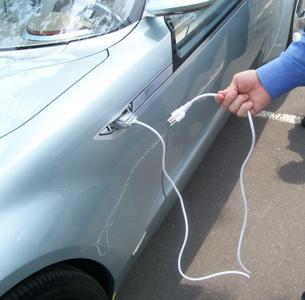Owners of hybrid and electric vehicles likely will face new taxes or fees to replace the savings they enjoy from paying less in gasoline taxes (if they drive a hybrid) or nothing (if they drive a fully electric vehicle), based on rules already passed in some states and being considered in others.
North Carolina is the latest state whose legislators are discussing new laws that would impose fees on drivers of hybrid and electric cars. The state of Washington passed a bill late last year to add a $100 annual fee for the ownership of electric vehicles and a $50 annual fee for the ownership of hybrid vehicles. Virginia has a $64 annual surcharge on hybrid vehicles. According to published news reports, Arizona, Michigan, Oregon, and Texas soon will be coming out with their own proposals. Other states may not be far behind.
“You can look at this a couple of different ways,” said Mitch Kakokai, a policy analyst for the North Carolina-based John Locke Foundation. “The legislature is trying to address long-term transportation needs. Cars are becoming more fuel-efficient in general. That [and the introduction of hybrid and electric vehicles] means less revenue from the gas tax. Dealing with that problem is a good idea.”
“We don’t have a problem with [the fees],” agreed John Bowman, spokesman for the National Motorists Association, a Waunakee, Wis.-based member association. “Our position is that a gas tax is the most equitable way to raise money for highway funds. When these [hybrid and electric vehicles] don’t use as much gas, they are a different animal. They should be kicking in some way. What is the right amount, no one can say.”
Heavy Reliance on Gas Tax
Loss of transportation funds from gas taxes is particularly critical in North Carolina, which has the second-most miles (behind Texas) of roads maintained by the state government, Kakokai said. Other states have more roads but have more upkeep on a relative basis from municipal and county sources. That is one reason North Carolina has the highest gasoline tax in the Southeast. Cars that generate little or nothing in gasoline taxes don’t contribute enough for the upkeep of the state-maintained roads, he said.
North Carolina is considering a fee similar to the one in Washington, which Kakokai says is reasonable. But the fee likely would be less than the amount of gasoline taxes a similarly sized car with a traditional gasoline engine would generate. There has yet to be a good, comprehensive study that quantifies the amount the typical car today generates in fuel taxes. Older studies may not be accurate because many older, less fuel-efficient vehicles were removed from the road during the “Cash for Clunkers” program a few years ago.
Opposition from Automakers
Auto manufacturers are objecting to some of these fees. In early June, Michigan’s House Transportation Committee voted to impose a one-time $75 fee for hybrid vehicles. In testimony against the legislation—Michigan HB 4632—General Motors spokesman Brian O’Connell said such a fee would create additional hurdles for a new market the federal government has sought to promote. The federal government and consumers want auto manufacturers to produce more fuel-efficient vehicles, yet state governments are proposing penalties that negate some of the advantages of those very vehicles, he said.
And there is another issue. In North Carolina and other states, legislators often siphon off some of the funds generated from gas taxes, tolls, and auto-related fees to spend on ventures unrelated to highways, such as bicycle trails or rail projects, or that have nothing to do with automobile transportation. This happens even though there are many unmet needs in the state transportation departments in North Carolina and elsewhere, Kakokai said.
Bowman says although the $50 to $100 fees may seem reasonable today, those fees could be increased if states continue to siphon money from transportation funds for other projects. Those fees also could be increased as motor vehicles continue to become more fuel efficient. With higher fuel efficiency, there would be less fuel consumption and, therefore, less fuel to tax.




